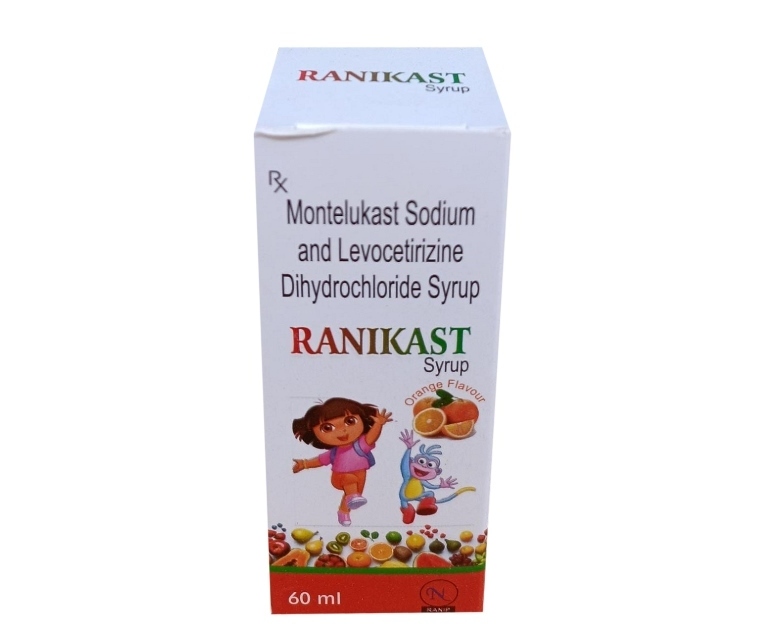Ranikast Syrup
MARKETED BY
Ranip Drugs (India) Pvt Ltd
SALT COMPOSITION
Levocetirizine (2.5mg/5ml) + Montelukast (4mg/5ml)
STORAGE
Store below 30°C

PRODUCT INTRODUCTION
Ranikast Syrup is a commonly prescribed medication for children,
aimed at alleviating allergy symptoms such as runny nose, sneezing, itching, swelling, congestion,
and watery eyes. It may also be beneficial in managing asthma and skin allergies.
Administer this medicine to your child at a designated time, either before or after meals,
following the prescribed dosage, schedule, and method of administration. For asthma treatment,
it is advisable to give Ranikast Syrup in the evening or about 2 hours before engaging in
physical activity. Regarding allergies, the best time for administration depends on when the
symptoms typically appear; either in the morning or evening. If your child experiences both
conditions, evening administration is preferred. If your child vomits within 30 minutes of
taking the medicine, give them the same dose again. However, if it is almost time for the
next dose, skip the repeated dose.
Although your child may start feeling better after regular doses, it is essential to complete
the entire prescribed course to ensure maximum benefit. Abruptly discontinuing the medicine
could worsen your child's condition. Ranikast Syrup may cause minor and temporary side
effects such as vomiting, diarrhea, nausea, dizziness, dry mouth, rash, and headache. Typically,
these side effects subside as the body adapts to the medication. In case these effects persist or
become troublesome, promptly consult your child's doctor.
Inform your child's doctor about any other medications your child is currently taking. Also, provide
a comprehensive medical history, including any past instances of allergies, heart problems, blood
disorders, vascular disorders, birth defects, airway obstruction, lung anomalies, skin disorders,
liver impairment, or kidney malfunction. This information is crucial for dose adjustments and to
plan your child's overall treatment effectively.
USES OF RANIKAST SYRUP
Treatment of sneezing and runny nose due to allergies
Treatment of hay fever
Treatment of allergic skin conditions
BENEFITS OF RANIKAST SYRUP
In Treatment of sneezing and runny nose due to allergies
Ranikast Syrup is a blended medication designed to alleviate symptoms like nasal congestion,
runny nose, sneezing, and irritated or watery eyes. Using this medicine can help you carry out
your daily activities with greater ease. Serious side effects are uncommon, and you might only
need to take it on days when symptoms are present. However, if you are using it for preventive
purposes, regular usage is recommended to achieve the maximum benefits.
In Treatment of hay fever
Hay fever, also known as allergic rhinitis, leads to symptoms similar to a cold, such as a
runny nose, itchy eyes, congestion, sneezing, and sinus pressure. The key distinction is
that hay fever symptoms are not caused by a virus but are instead the body's allergic responses
to allergens (substances that trigger allergies, like pollen). Ranikast Syrup is used to
alleviate these hay fever symptoms. Its mechanism involves inhibiting the release of the
chemical responsible for producing such allergic reactions. Ranikast Syrup is a safe medication
that effectively treats hay fever and provides relief, promoting a sense of comfort.
In Treatment of allergic skin conditions
Ranikast Syrup has proven efficacy in addressing allergic skin conditions characterized by
inflammation and itching. It operates by diminishing the impact of certain chemicals within the
body that trigger skin inflammation. When used as directed, it serves as a secure and efficient
treatment, reducing redness, rashes, pain, or itchiness resulting from skin reactions to irritants.
Consequently, it contributes to enhancing self-esteem and confidence as it brings about positive
changes in one's appearance. To reap the complete advantages, it is essential to continue taking
the medication for the entire prescribed duration.
SIDE EFFECTS OF RANIKAST SYRUP
Most side effects do not require any medical attention and disappear as your body adjusts to the medicine. Consult your doctor if they persist or if you’re worried about them.
Common side effects of Ranikast Syrup
- Nausea
- Vomiting
- Diarrhea
- Dryness in mouth
- Fatigue
- Headache
- Skin rash
- Sleepiness
HOW TO USE RANIKAST SYRUP
Take this medicine in the dose and duration as advised by your doctor. Check the label for directions before use. Measure it with a measuring cup and take it by mouth. Shake well before use. Ranikast Suspension may be taken with or without food, but it is better to take it at a fixed time.
HOW RANIKAST SYRUP WORKS
Ranikast Syrup is a medication that combines Levocetirizine and Montelukast to alleviate symptoms associated with allergies, such as sneezing and a runny nose. Levocetirizine acts as an antiallergic agent by inhibiting the activity of histamine, a chemical messenger responsible for causing runny nose, watery eyes, and sneezing. On the other hand, Montelukast functions as a leukotriene antagonist, blocking another chemical messenger called leukotriene. This action helps to reduce inflammation and swelling in the airways and nose, leading to an improvement in allergy symptoms.

Kidney
CAUTION
Ranikast Syrup should be used with caution in patients with kidney disease. Dose adjustment of Ranikast Syrup may be needed. Please consult your doctor. Use of Ranikast Syrup is not recommended in patients with severe kidney disease.

Liver
SAFE IF PRESCRIBED
Ranikast Syrup should be used with caution in patients with severe liver disease. Dose adjustment of Ranikast Syrup may be needed. Please consult your doctor. Limited information is available on the use of Ranikast Syrup in these patients. No dose adjustment is recommended in patients with mild to moderate liver disease.
WHAT IF YOU FORGET TO TAKE RANIKAST SYRUP?
In the event of a missed dose of Ranikast Syrup, take it as soon as you remember. However, if your next scheduled dose is approaching, skip the missed dose and return to your regular dosing schedule. Avoid taking a double dose to compensate for the missed one.




